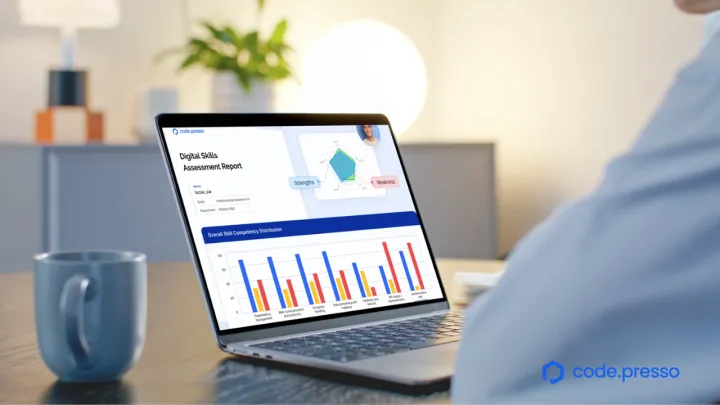A Structured Growth Path Toward Becoming an Automotive Software Engineer

Curriculum Structure & Flexible Learning Format
The Mobius Bootcamp—Hyundai Mobis’ signature software talent development initiative for its partner companies—goes far beyond traditional training. It delivers a real-world, industry-aligned curriculum specifically crafted to develop next-generation automotive software engineers.
In this article, we provide a detailed look at the Mobius Bootcamp course structure, its flexible learning components, and the unique value it brings to both participants and partner organizations.
Mobius Bootcamp distinguishes itself with three key curriculum innovations. Let’s explore what makes this program truly stand out in the era of Software-Defined Vehicles (SDVs).
Three Key Features of the Mobius Bootcamp Curriculum
1. Premium Hands-On Experience with Industry-Grade Tools
One of the most unique strengths of the Mobius Bootcamp is its unmatched practical training environment. Participants gain access to premium commercial tools typically reserved for high-level professionals in the automotive software industry—tools that are often cost-prohibitive for individuals.
Among them are:
- Vector CANoe – A powerful vehicle communication and diagnostics platform
- MORAI Autonomous Driving Simulator – A cutting-edge simulator for ADAS and autonomous vehicle development
By working directly with these platforms, learners acquire job-ready skills and develop real-world project experience in a simulated, industry-standard environment. This approach bridges the gap between theoretical learning and practical application.
2. Curriculum Backed by Hyundai Mobis Expertise
The Mobius Bootcamp curriculum is built upon Hyundai Mobis’s proven internal training programs, used by its own engineering teams. Each course module is curated from content that has been tested and validated in real-world applications over many years.
This ensures that participants benefit from:
- Industry-relevant, field-tested knowledge
- A project-based learning model that mirrors real automotive software workflows
- Direct exposure to skills and methodologies recognized across the sector
3. Flexible Learning with Real-Time Feedback
To support a diverse range of learners, the Mobius Bootcamp blends self-paced online learning with live interactive sessions. These include:
- Live lectures with Hyundai Mobis instructors
- Real-time code reviews and feedback
- Interactive mentoring opportunities
This flexible and responsive format allows participants to learn at their own pace while still benefiting from expert guidance and structured progression.
Three-Step Growth Roadmap for Automotive Software Careers
The Mobius Bootcamp offers a structured, real-world learning path designed to develop future-ready software engineers in the mobility industry.
- Common Software Track: Build foundational programming and software skills.
- Embedded Software Track: Gain hands-on expertise in embedded systems and integration.
- Mobility Software Track: Specialize in advanced areas like autonomous driving and connected vehicles.
Each stage blends core software concepts—from coding to architecture—with practical, project-based learning tailored to the automotive field.
① Common Software Track: Core Foundations for Future Developers
The Common Software Track is designed to equip all participants—regardless of background or specialization—with the core competencies essential for any software engineer in today’s mobility-driven industry. It focuses on the fundamentals of software engineering, programming languages, and computer science principles, building a strong technical base for long-term growth.
- Key Modules Include:
- Software Engineering Basics – Understanding software principles, automotive software workflows, and vehicle system architecture
- Core Programming – Hands-on learning in C, C++, Java, and Python for diverse development needs
- CS Essentials – Mastery of data structures, algorithms, Linux environments, and version control using Git
- Final Goal:
- Develop computational thinking and practical problem-solving abilities to confidently tackle real-world software challenges and transition into specialized tracks.
- Best Suited For:
- New developers starting their software journey
- Non-CS majors seeking structured, technical training
- Junior engineers looking to reinforce core concepts before diving into advanced automotive systems
Specialization: Designing Your Own Expert Pathway
After mastering the fundamentals, participants can customize their learning journey through specialized modules in either the Embedded Software Track or Mobility Software Track, based on their personal interests and career goals.
Rather than completing every module, learners are encouraged to select and combine courses strategically to build targeted expertise.
For example:
- Aspiring Embedded Systems Developers can focus on modules covering real-time systems and low-level programming.
- Those aiming for careers in Autonomous Driving can choose mobility-specific courses aligned with ADAS and AI-based development.
This flexible, goal-oriented structure empowers participants to create a personalized pathway toward becoming a future-ready automotive software expert.
② Embedded Software Track: Mastering Hardware Control and System Optimization
The Embedded Software Track builds on foundational skills to prepare participants for the complex world of embedded systems, where software directly interacts with hardware and performance optimization is critical.
The program is structured progressively—from software architecture design to Linux system integration and quality assurance—so learners can advance step by step with confidence.
- Key Modules Include:
- Software Architecture – Requirements analysis, system modeling, and design principles
- Embedded System Development – Linux kernel analysis, Yocto project, and system tracing
- Quality & Verification – Software testing, static code analysis, and advanced debugging with TRACE32
- Final Goal:
- Equip participants with the ability to design, implement, and stabilize embedded systems optimized for specific hardware platforms—bridging theory with real-world application.
- Best Suited For:
- Junior developers pursuing careers in firmware or Board Support Package (BSP) development
- Professionals looking to deepen expertise in low-level software and hardware control
- Engineers specializing in embedded testing, debugging, and quality assurance
③ Mobility Software Track: Autonomous Driving, Standards, and Cybersecurity
The Mobility Software Track focuses on the cutting-edge technologies driving the future of mobility, including autonomous driving systems, automotive platform standards, functional safety, and cybersecurity.
This advanced track equips participants with highly sought-after, industry-ready skills that directly apply to real-world vehicle development—making them competitive specialists in next-generation mobility.
- Key Modules Include:
- Automotive Standards & Processes – AUTOSAR, ISO 26262 (Functional Safety), ASPICE compliance
- Networking & Cybersecurity – CANoe, automotive cybersecurity fundamentals & advanced TARA methodology
- Autonomous Driving & Simulation – MATLAB/Simulink, ROS-based perception, decision-making, and control systems
- Final Goal:
- Develop the expertise to design and integrate autonomous, secure, and standards-compliant automotive software systems, supported by hands-on simulation and project work.
- Best Suited For:
- Developers needing AUTOSAR, CAN, and functional safety expertise
- Job seekers aiming for careers in autonomous driving or automotive cybersecurity
- Engineers seeking to advance in Model-Based Design (MBD) and simulation
Freedom to Choose, with Guided Learning Pathways
Unlike traditional training programs, the Mobius Bootcamp offers participants the flexibility to design their own learning journey. Rather than enforcing a fixed course order, learners can select modules from the Embedded Software Track and Mobility Software Track to align with their unique goals.
To help maximize results, the program also provides recommended pathways tailored to different participant types:
|
Participant Type |
Recommended Pathway |
|
Job |
Common Software Track → Mobility Track → Team Project |
|
Working |
Skill Diagnostic → Focused Learning on Gaps → Specialization Modules |
🎯 Outcomes by Profile
- Job Seekers – Gain mobility-focused expertise, complete team projects, and become fully job-ready for hiring opportunities.
- Working Professionals – Achieve measurable skill growth, refine problem-solving abilities, and enhance value within their organizations.







Comments ()